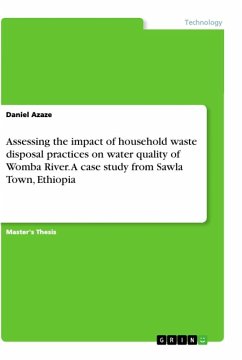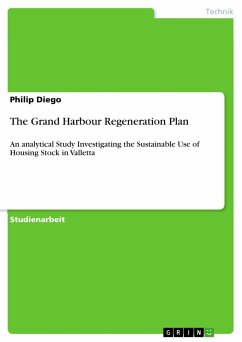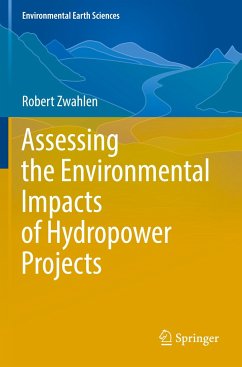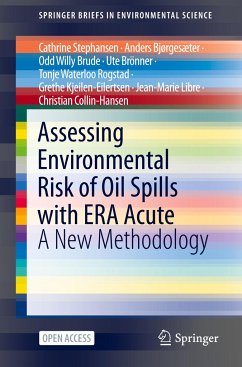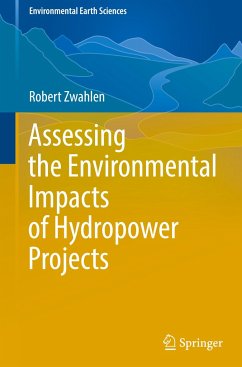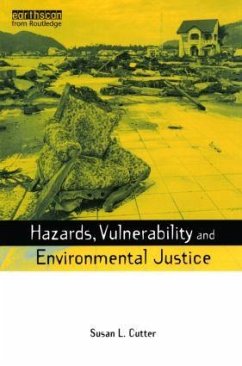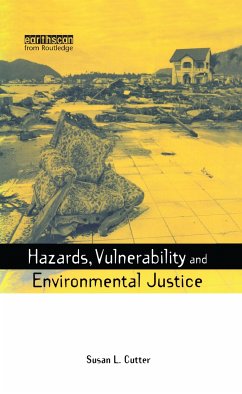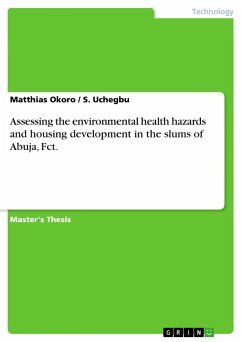
Assessing the environmental health hazards and housing development in the slums of Abuja, Fct.
Versandkostenfrei!
Versandfertig in 1-2 Wochen
52,95 €
inkl. MwSt.

PAYBACK Punkte
0 °P sammeln!
Master's Thesis from the year 2014 in the subject Environmental Sciences, grade: A, University of Nigeria (CENTER FOR ENVIRONMENTAL MANAGEMENT AND CONTROL), course: ENVIRONMENTAL MANAGEMENT AND CONTROL, language: English, abstract: The hypotheses formulated here are, that the indicators of environmental health hazards and housing development as measured by the number of houses are not significant in the slums of Abuja, that the spread of health devastating diseases and ramshackle developed houses are not significant in the slum areas and that the Environmental Health Hazards does not differ si...
Master's Thesis from the year 2014 in the subject Environmental Sciences, grade: A, University of Nigeria (CENTER FOR ENVIRONMENTAL MANAGEMENT AND CONTROL), course: ENVIRONMENTAL MANAGEMENT AND CONTROL, language: English, abstract: The hypotheses formulated here are, that the indicators of environmental health hazards and housing development as measured by the number of houses are not significant in the slums of Abuja, that the spread of health devastating diseases and ramshackle developed houses are not significant in the slum areas and that the Environmental Health Hazards does not differ significantly among the slum areas. Secondary source of data collection such as written source materials and primary source of data collection, which include participant observation, questionnaire, oral interview and laboratory work, were employed to collect data. The sample size number was firstly determined using Yaro Yamani formula. Yaro Yamani formula is donated as: n = population/ 1+population (significance level)2. This gave 400 questionnaires. But four-hundred questionnaires were just 0.75% of the total estimated average household. In other to get a sample size that represents at least two percent of the total estimated average household size, it was done by finding two percent of an estimated average household size in each of the slums. So, 1067 questionnaire that amount to two percent of the total estimated average household were randomly distributed to the dwellers of ten sampled slum areas of Abuja and 652 were retrieved. After the analyses, the Principal Component Analysis produce factor scores of environmental health hazards and housing development from different slums, which shows that the indicators of environmental health hazards in the form of dirty drains and open waste dumps increase with houses and house hold numbers. The PCA further produce factor score of the occurrence of health devastating diseases and ramshackle developed houses in the slums ofAbuja, which shows that health devastating diseases increase with high number of ramshackle developed houses. Also the result of one way ANOVA conducted shows that the calculated F Value for all the heavy metals in the soil are less than the Critical F Value of 4.76 at 3and 6 degree of freedom with confident level of 0.05 The analysis also shows that the calculated significant level is above 99% in all the variables, meaning that the rate of environmental health hazards in form of heavy metal concentrations in the soil does not differ significantly among the slums. These findings show that the indicator of environmental hazards does not affect the rate of housing development in the various



